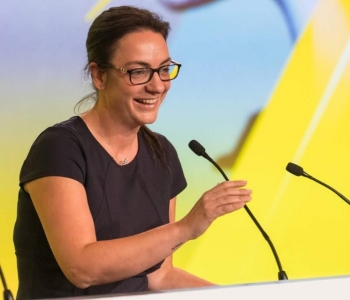How One Girl Scout Alum Pivoted Her Business Model

When Becky Harris’s husband suggested in 2009 that she quit her chemical engineering job so they could launch a distillery together, it didn’t occur to her that one day the two would be making hand sanitizer.
“It’s something we can do, so we felt like it was our duty to pitch in,” says Harris, co-owner of Catoctin Creek Distilling Company in Loudoun County, Virginia, which is best known for its award-winning Virginia Rye.
“When you look at the industries that are able to spin this up in a hurry, small distilleries are one of the few that are able to order large amounts of ethanol quickly,” the Girl Scout alum explains. “You need a federal permit, and if you’re a distillery you have that permit.”
Catoctin Creek’s customers have been supportive of the sudden shift.
“Our customers understand that when grocery workers, city employees, and sheriff’s deputies don’t have access to soap and water like people do at home, they have to have the hand sanitizer,” says Harris, who has spent the last couple weeks navigating the quickly changing rules and regulations for making the product.
“The biggest problem is that when we make whisky it’s a beverage. The hand sanitizer is an over-the-counter drug, so it’s an entirely different set of regulations,” she says. “We see the desperate need of institutions around us, so we’re trying to navigate through layers of bureaucracy. The FDA has been trying to accommodate the need by adding flexibility, so the rules keep changing.”
Harris is a board member of a local trade group, and she’s been sharing what she learns with others in the group so that they, too, can produce hand sanitizer safely and responsibly.
Supplies have definitely been an issue.
“We put in our first order for ethanol and then discovered that [the right size] bottles are unavailable.”
Still, everyone in her company has rallied around the work; they’re on their second batch now.
“Our employees want to pitch in and the community is excited,” she says. “We’re really, really tiny and at some point the bigger supply chain will catch up with this issue. In the meantime, we’re happy to fill the need.”
Not surprisingly, Harris’s business has been impacted by the growing pandemic, though they recently started offering curbside pickup of their whiskey and gin products.
“A lot of business goes through our tasting room, and our tasting room is closed,” she says. “There are a lot of small distilleries that may not make it through this, and our partners in hospitality—restaurants, bars—are going through a tough time, too.”
Harris points to the value of keeping busy in these challenging times, “so that we can’t focus on all of the other things we could be worrying about,” she says. “Having the ability to [make sanitizer] means we can keep our sales people busy. They’re also here working on bottling the sanitizer, pitching in with the production employees and office employees.”
“It’s what you do in a challenge—kind of like being a Girl Scout. You get a challenge and you dig deep to make things happen.”
 Sign up now: FREE Girl Scout Network enewsletter
Sign up now: FREE Girl Scout Network enewsletter
Sign up for monthly insights from alums who pay it forward with career tips, invitations to national and local events, advocacy, volunteer opportunities, and more! Connect to the Girl Scout Network.





